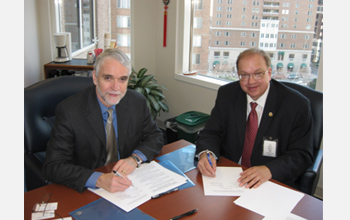News Release 10-045
NSF Announces Partnership with Association of Petroleum Geologists to Increase Funding for Earth Sciences
Agreement is first joint NSF-energy industry funding effort

NSF Assistant Director Tim Killeen and AAPG Executive Director Rick Fritz sign new agreement.
March 25, 2010
This material is available primarily for archival purposes. Telephone numbers or other contact information may be out of date; please see current contact information at media contacts.
The National Science Foundation (NSF) today announced a partnership with the American Association of Petroleum Geologists (AAPG) to increase funding in the earth sciences over the next five years.
The agreement is the first NSF-energy industry collaboration of its kind, opening doors to new possibilities that bring together contributions and expertise from both organizations.
"This is the first NSF-energy industry funding program for academia-centered basic research in the geosciences," says Tim Killeen, NSF assistant director for Geosciences, who signed the agreement along with AAPG Foundation Executive Director Rick Fritz.
"This innovative effort takes NSF in new partnership directions," says Killeen, "and represents a major step forward for funding the earth sciences."
"Advances in basic geoscience research are the basis for new solutions to societal needs, ranging from natural resources to understanding Earth's history," says Fritz. "The AAPG Foundation is committed to these scientific objectives, and is pleased to partner with NSF to move toward this goal."
NSF and the AAPG Foundation will expand collaborative support for basic research in the earth sciences, which will contribute to:
- better hazard prediction and mitigation;
- understanding the geologic setting of natural resources, such as groundwater, minerals and energy;
- knowledge of deep-time climates and their relevance to modern climate issues;
- restoration of rivers, deltas, coasts and farmlands affected by human activities;
- understanding the four-billion-year history of life on Earth;
- increased science capabilities and competence of U. S. students and universities;
responding to needs and challenges in the earth sciences identified by government, industry and academia.
The agreement covers the period July 1, 2010, to July 1, 2015, at which time it may be renewed.
The AAPG Foundation's primary goal is to provide funding for educational, charitable and scientific objectives that directly and indirectly benefit the geologic profession and the general public.
-NSF-
-
NSF and the AAPG will coordinate research funding to support new earth sciences research.
Credit and Larger Version
Media Contacts
Cheryl Dybas, NSF, (703) 292-7734, email: cdybas@nsf.gov
Larry Nation, AAPG, (800) 364-2274 x 648, email: lnation@aapg.org
The U.S. National Science Foundation propels the nation forward by advancing fundamental research in all fields of science and engineering. NSF supports research and people by providing facilities, instruments and funding to support their ingenuity and sustain the U.S. as a global leader in research and innovation. With a fiscal year 2023 budget of $9.5 billion, NSF funds reach all 50 states through grants to nearly 2,000 colleges, universities and institutions. Each year, NSF receives more than 40,000 competitive proposals and makes about 11,000 new awards. Those awards include support for cooperative research with industry, Arctic and Antarctic research and operations, and U.S. participation in international scientific efforts.
Connect with us online
NSF website: nsf.gov
NSF News: nsf.gov/news
For News Media: nsf.gov/news/newsroom
Statistics: nsf.gov/statistics/
Awards database: nsf.gov/awardsearch/
Follow us on social
Twitter: twitter.com/NSF
Facebook: facebook.com/US.NSF
Instagram: instagram.com/nsfgov



